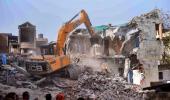With several state administrations flattening the houses of those involved in criminal cases with bulldozers, the Supreme Court on Monday questioned how can anybody's house be demolished just because he is an accused.

The court said it will lay down the guidelines on the issue that would be enforceable across the country.
"How can anybody's house be demolished only because he is an accused? Even if he is a convict, still it can't be done without following the procedure as prescribed by law," a bench of Justices B R Gavai and K V Viswanathan said.
The court, however, said it will not protect any unauthorised construction or encroachment on public roads.
Solicitor General Tushar Mehta, appearing for Uttar Pradesh, referred to an earlier affidavit filed by the state in the matter.
He said the affidavit states that merely because a person was alleged to have been a part of some offence can never be a ground for demolition of his immovable property.
Mehta said the state has said that demolition of an immovable property can take place 'only for violation of and in accordance with the procedure prescribed in the respective applicable municipal law or law governing development authorities of the area'.
He said no immovable property can be demolished solely on the ground that the owner or occupant of such property was involved in a criminal offence.
"If you are accepting this position, we will record and issue guidelines for all the states," the bench said.
"We are not going to protect any unauthorised construction or encroachment in public roads. Not even the temples on public roads," the top court said.
Mehta said the issue will be discussed with states in order to find a solution.
"Though it is a question of law, it is seen that it is followed more in breach," the bench observed.
The solicitor general said the petitioners have projected the issue as if houses were demolished only because some people committed an offence.
Mehta said he can show that authorities had issued notices well in advance before demolition was carried out.
"This controversy can be put to an end by my (Uttar Pradesh) affidavit which I had filed long time back," he said.
Stressing on the need for formulating guidelines on the issue, the bench said it was necessary to ensure that neither an individual takes advantage of a loophole nor authorities rely on lacunae.
"As they said, a pious father can have recalcitrant son and vice-versa, but this is no way to go about it," the bench said.
Senior advocate Dushyant Dave, appearing for one of the petitioners, said, "Let a statement be recorded that across the country, bulldozer justice will not be meted out to people". He said almost every state was now indulging in this and demolishing properties.
Senior advocate C U Singh, appearing for some applicants, referred to demolition of properties in some other states.
"We will lay down guidelines for across the country," the bench said.
The top court noted that these petitions have raised grievances about immovable properties of people accused of crime being demolished.
It said this position has been disputed by Uttar Pradesh and an affidavit has been filed by the state which says immovable properties can be demolished only in accordance with the procedure prescribed by law.
"We propose to lay down certain guidelines on a pan-India basis so that the concerns with regard to the issues raised are taken care of," the bench said.
The bench asked the counsel for the parties to give their suggestions so that the court can frame appropriate guidelines which will be applicable on a pan-India basis.
It asked the parties to supply the copy of their suggestions to the counsel appearing for Madhya Pradesh and said the state's lawyer will collate them.
It posted the matter for further hearing on September 17.
When some individual cases were mentioned before the court, the bench said, "Let us try to resolve the issue on a pan-India basis."
Following some sharp exchanges between the lawyers, the bench said, "Let the courtroom be not turned into a battleground".
The top court was hearing the petitions filed by 'Jamiat Ulama-i-Hind' and others seeking directions to various state governments to ensure no further demolition of properties of those accused in cases of rioting and violence takes place.
The 'Jamiat Ulama-i-Hind' had earlier filed a plea in the apex court over demolition of some buildings in Jahangirpuri area of the national capital.
The Muslim body had earlier filed a petition in the apex court seeking directions to the Uttar Pradesh government to ensure no further demolition of properties of those accused of violence was carried out in the state.
It had also said no demolition should be carried out without following the due process and sans prior notice.











 © 2025
© 2025